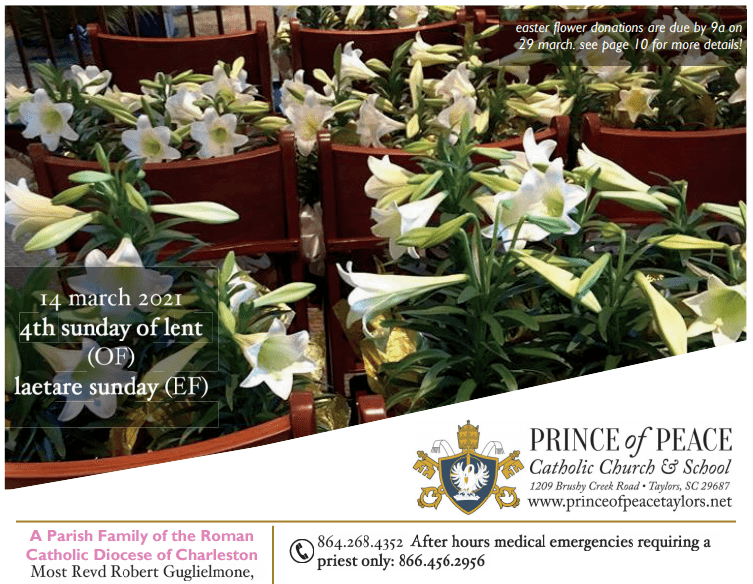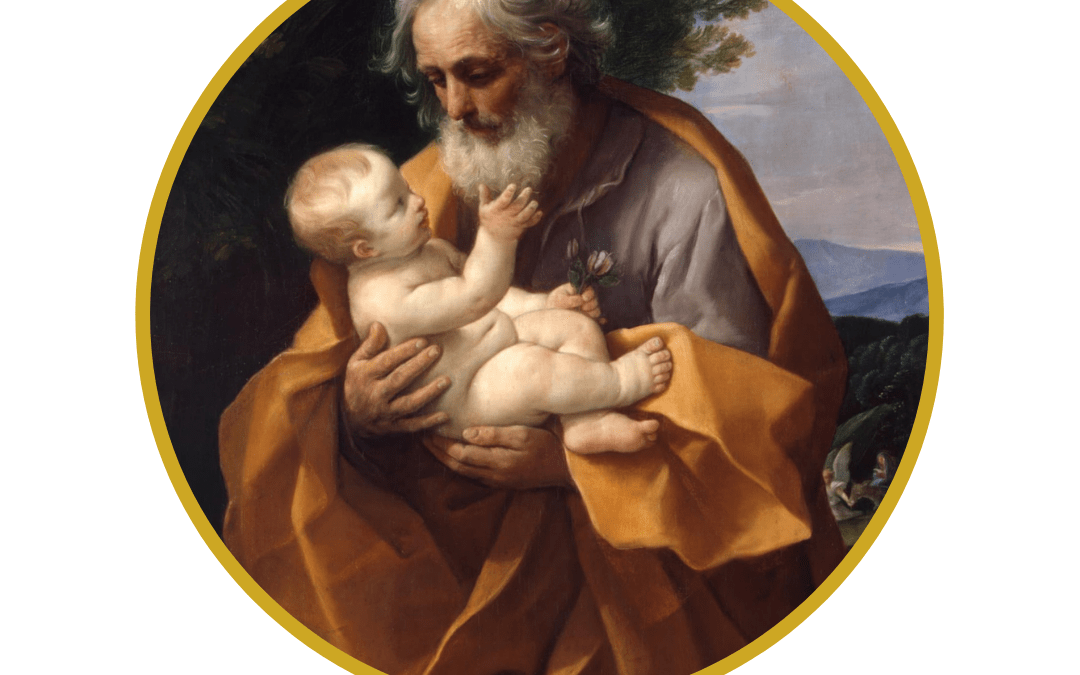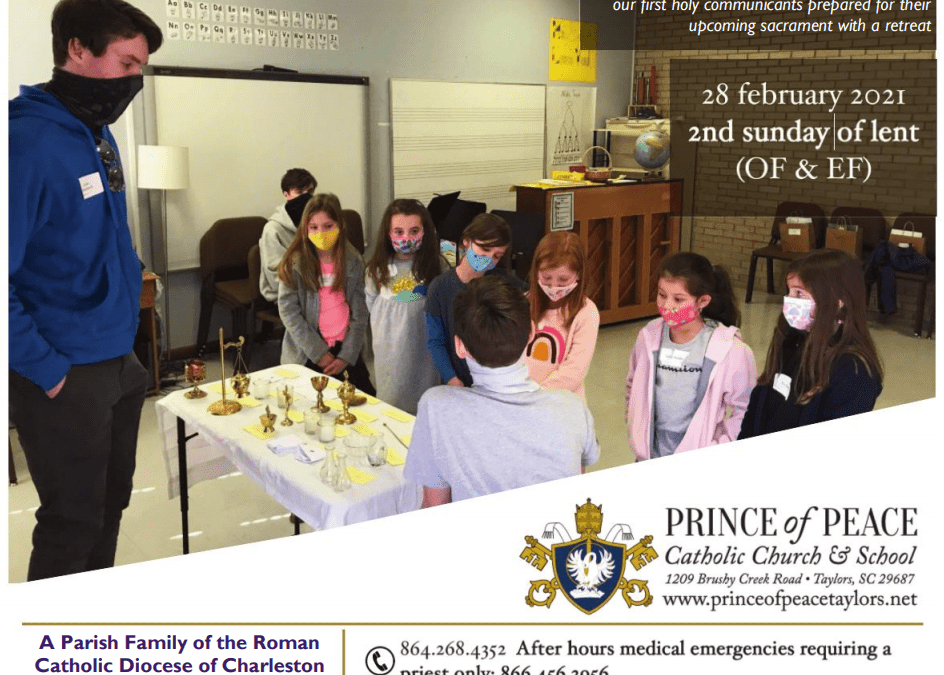
28 March 2021 Bulletin
Click to read the 28 March 2021 Bulletin!

Click to read the 28 March 2021 Bulletin!

23 March: Saint Toribio, orTuribius Alfonso de Mogrovejo, was born in 1538 in Spain. His father was mayor of the city. At age twelve, he was sent to be educated in the humanities. He then studied law at the University of Salamanca. He was so brilliant a scholar that even though he was a layman, King Philip II appointed him chief judge of the Inquisitorial Court of Granada. As he prosecuted his duties so well, the king proposed him to the pope as the Archbishop of Lima. Gregory XIII named Toribio to this office in 1579, despite the fact that the shocked Toribio pleaded his incapacity for the office and argued that the canons prevented a layman from being appointed. Toribio eventually agreed and was consecrated a bishop. He then set out for the New World. After arriving in Lima in 1581, Toribio wasted no time in getting to work. His archdiocese was huge, encompassing about 400 miles. One of Toribio’s greatest accomplishments was overseeing the Third Provincial Council of Lima (1582-1583), one of the most important and far-ranging councils held in the Americas. Among other things, Toribio worked to implement the decrees of the Council of Trent in the Americas. He focused on the reformation of the clergy and the evangelization of the Indians. Toribio established the first seminary in the New World at Lima in 1590. Toribio also conducted pastoral visitations of his diocese, travelling across the entirety of the territory by foot. His visits took seventeen years to accomplish, covering 18,000 miles. Moving from parish to parish, he made an effort to know and instruct his flock, whether Spanish or Indian. For the salvation of souls, he made nocturnal journeys during torrential downpours of rain or on rugged paths covered in snow. Even on these long journeys, Toribio always said mass each morning and made a daily confession to his chaplain. In order to reach all of his flock, Toribio traversed steep and rugged mountains, sometimes by himself, to bring the Gospel to the natives in outlying areas. Oftentimes, he would dwell in the hut of the Incas for a few days with no food or bedding, preaching to the whole tribe, baptizing and confirming them. Toribio saw himself as a missionary and “Protector of the Indians.” St. Toribio also personally knew some of the great saints of South America. He gave the Sacrament of Confirmation to St. Rose of Lima, St. Martin de Porres and St. John Macias. He was also a good friend to St. Francis Solano, “the Wonderworker of the New World.” On one of his many journeys, Toribio was taken ill. He died on March 23, 1606, repeating the very words of Christ, “Into thy hands, I commend my spirit.” Toribio was beatified by Innocent XI in 1697 and canonized by Benedict XIII in 1726. Together with Rose of Lima, St. Toribio is the first known saint of the New World. He is the patron saint of indigenous/Native rights, Latin American bishops, and Peru.
Ideas for celebrating in your home:

Click to read the 21 March 2021 Bulletin!

Click to read the 14 March 2021 Bulletin. Note that changes to the scheduled are noted and being updated as changes happen on this link.

19 March: Solemnity of Saint Joseph. The Church celebrates two feast days for Saint Joseph: March 19 for Joseph the Husband of Mary and May 1 for Joseph the Worker. March 19 has been the more commonly celebrated feast; it wasn’t until 1955 that Pope Pius XII established the Feast of “St. Joseph the Worker” on May 1 (this is also “May Day” – International Workers’ Day). Saint Joseph is well known as the head of the Holy Family. He is silent in scripture, yet, spoken words are not needed for us to understand what a godly man Joseph was. Here is what Pope Benedict XVI says of Joseph’s silence: “The silence of Saint Joseph is given a special emphasis. His silence is steeped in contemplation of the mystery of God in an attitude of total availability to divine desires. It is a silence thanks to which Joseph, in unison with Mary, watches over the Word of God, known through the Sacred Scriptures, continuously comparing it with the events of the life of Jesus; a silence woven of constant prayer, a prayer of blessing of the Lord, of the adoration of His holy will and of unreserved entrustment to his providence. It is no exaggeration to think that it was precisely from his “father” Joseph that Jesus learned… Let us allow ourselves to be “filled” with Saint Joseph’s silence! In a world that is often too noisy, that encourages neither recollection nor listening to God’s voice.”
Saint Joseph is the guardian and patron of the Universal Church, as well as of many causes including workers, fathers, and a happy death, due to the tradition that he died in Jesus and Mary’s arms.
“Inspired by the Gospel, the Fathers of the Church from the earliest centuries stressed that just as St. Joseph took loving care of Mary and gladly dedicated himself to Jesus Christ’s upbringing, he likewise watches over and protects Christ’s Mystical Body, that is, the Church.”– POPE ST. JOHN PAUL II
Ideas for celebrating in your home:
9 March: Feast of Saint Frances of Rome. Frances (Francesca) was born in 1384 in Rome. Her parents were wealthy nobility. As a child, Frances was very devout. She decided at age eleven to become a nun. Frances’ father said no; he had already promised her in marriage to someone. Frances was very upset; she begged God to stop the marriage from happening. She complained to her confessor, who responded, “Are you crying because you want to do God’s will, or because you want God to do your will?” Frances reluctantly agreed to the marriage. She married Lorenzo Ponziani, a good man who treated her well. He was nobility and his family was prominent in society. Frances was very shy, so the parties that now filled her life were torturous. Frances became so overwrought with social anxiety that she collapsed bedridden for months, unable to eat or move. Near the point of death, Frances had a vision in which Saint Alexis said God was giving a choice: she could choose to recover, or not. Though she would have preferred to die, Frances said, “God’s will in mine.” St. Alexis then told her that she would live, and that by doing so she would glorify God. Frances recovered. As she became acquainted with her new relatives, Frances discovered that her sister-in-law also wished to live a life of service and prayer. They became close friends. With their husbands’ blessings, Frances and Vannozza constantly helped the poor. Frances then had three children and devoted herself as a good wife and mother. When disease and famine came to Rome, Frances took care of the sick and poor. Her father-in-law was furious at Frances for giving away the family’s stores of food, but when the food was miraculously replenished, he relented. Frances used all her money to help the poor. When all their resources were gone, Frances and Vannozza went door to door begging. As war raged, Frances suffered the loss of her son who was taken as a hostage. But he was returned to her after she entrusted his life to the Blessed Virgin. Frances later lost her younger two children to the plague. Her house was demolished. Despite these sufferings, she turned her home into a hospital. When war was over, her husband returned injured and Frances took care of him. Frances then received permission to start a society of women bound by no vows. This order, the Oblates of Mary, lived in the world but offered themselves wholly to God and the service of the poor. Frances chose not to live with the Oblates but rather at home with her husband. She did this for seven years, taking care of her husband until he passed away. Frances then joined the Oblates in 1436 as their superior. During her later years she received frequent visions and ecstasies. It is said that for twenty-three years her guardian angel was visible to her, aiding her work. She died in 1440 and was canonized by Pope Paul V in 1608. In 1925, Pope Pius XI made Saint Frances the patron saint of car drivers, because of a legend that an angel used to light the road in front of her when she travelled. She is also the patron saint of widows.
“It is most laudable in a married woman to be devout, but she must never forget that she is a housewife. And sometimes she must leave God at the altar to find Him in her housekeeping.” – St. Frances of Rome
Ideas for celebrating in your home:

Click to read our 7 March 2021 Bulletin! Updates to our campus schedule were made after this bulletin was printed. Please refer to the changes due to the lighting project link.

Our 28 February 2021 Bulletin is available here
Recent Comments